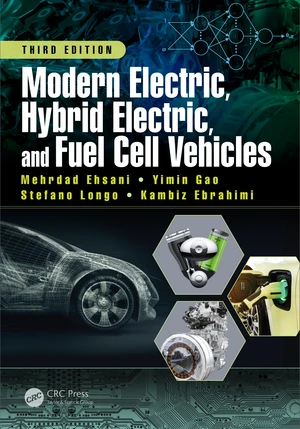"This book is an introduction to automotive technology, with specic reference to battery electric, hybrid electric, and fuel cell electric vehicles. It could serve electrical engineers who need to know more about automobiles or automotive engineers who need to know about electrical propulsion systems. For example, this reviewer, who is a specialist in electric machinery, could use this book to better understand the automobiles for which the reviewer is designing electric drive motors. An automotive engineer, on the other hand, might use it to better understand the nature of motors and electric storage systems for application in automobiles, trucks or motorcycles. The early chapters of the book are accessible to technically literate people who need to know something about cars. While the rst chapter is historical in nature, the second chapter is a good introduction to automobiles, including dynamics of propulsion and braking. The third chapter discusses, in some detail, spark ignition and compression ignition (Diesel) engines. The fourth chapter discusses the nature of transmission systems.â âJames Kirtley, Massachusetts Institute of Technology, USA âThe third edition covers extensive topics in modern electric, hybrid electric, and fuel cell vehicles, in which the profound knowledge, mathematical modeling, simulations, and control are clearly presented. Featured with design of various vehicle drivetrains, as well as a multi-objective optimization software, it is an estimable work to meet the needs of automotive industry.â âHaiyan Henry Zhang, Purdue University, USA âThe extensive combined experience of the authors have produced an extensive volume covering a broad range but detailed topics on the principles, design and architectures of Modern Electric, Hybrid Electric, and Fuel Cell Vehicles in a well-structured, clear and concise manner. The volume offers a complete overview of technologies, their selection, integration & control, as well as an interesting Technical Overview of the Toyota Prius. The technical chapters are complemented with example problems and user guides to assist the reader in practical calculations through the use of common scientic computing packages. It will be of interest mainly to research postgraduates working in this eld as well as established academic researchers, industrial R&D engineers and allied professionals.â âChristopher Donaghy-Sparg, Durham University, United Kingdom The book deals with the fundamentals, theoretical bases, and design methodologies of conventional internal combustion engine (ICE) vehicles, electric vehicles (EVs), hybrid electric vehicles (HEVs), and fuel cell vehicles (FCVs). The design methodology is described in mathematical terms, step-by-step, and the topics are approached from the overall drive train system, not just individual components. Furthermore, in explaining the design methodology of each drive train, design examples are presented with simulation results. All the chapters have been updated, and two new chapters on Mild Hybrids and Optimal Sizing and Dimensioning and Control are also included ⢠Chapters updated throughout the text. ⢠New homework problems, solutions, and examples. ⢠Includes two new chapters. ⢠Features accompanying MATLABTM software.
Price history
▲0.74%
Dec 28, 2021
€138.24
▼-0.13%
Dec 21, 2021
€137.23
▼-0.14%
Dec 14, 2021
€137.41
▲0.3%
Dec 13, 2021
€137.61
▲0.01%
Dec 7, 2021
€137.20
▼-0.74%
Dec 6, 2021
€137.20
▼-0.02%
Dec 2, 2021
€138.21
Oct 25, 2021
€138.24

